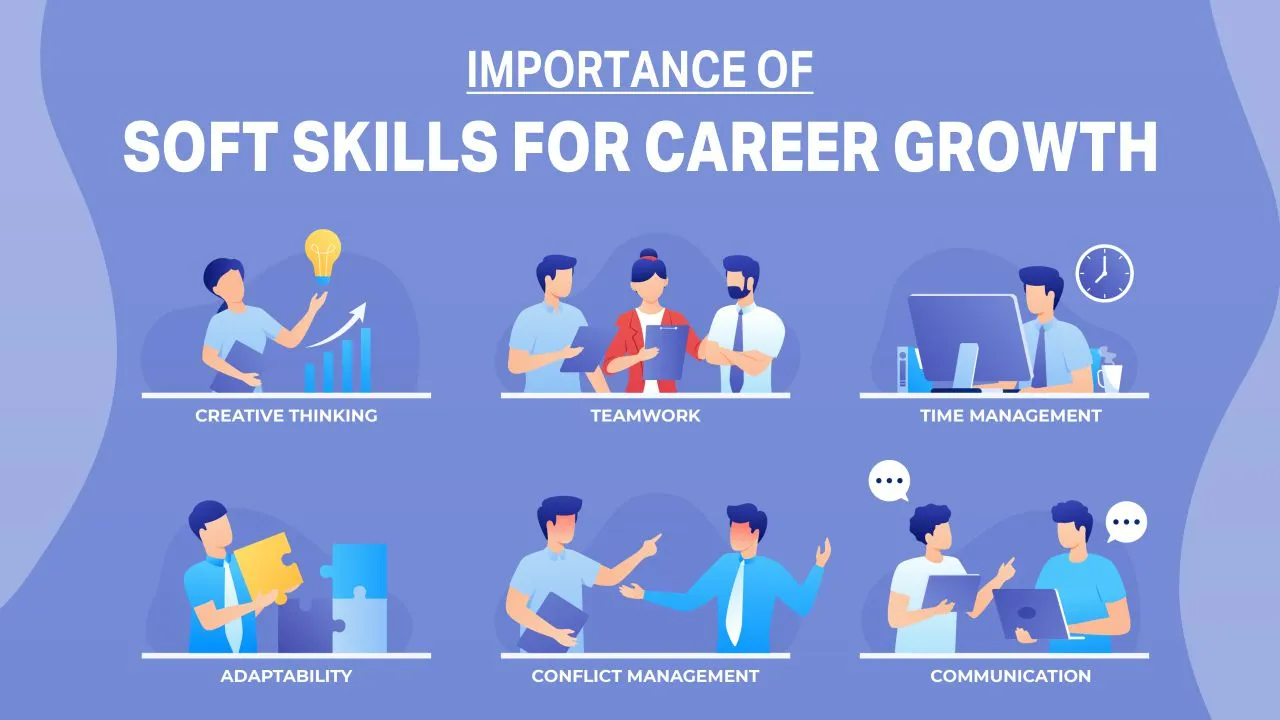
Importance of Soft Skills for Career Growth
In today’s dynamic and competitive job market, technical expertise alone is not enough to ensure career success. The importance of soft skills becomes crucial and plays a pivotal role in shaping an individual’s professional journey. These skills encompass communication, teamwork, problem-solving, adaptability, and more. Here, we’ve explored the importance of soft skills in career growth and how developing them can pave the way for a rewarding and prosperous professional life.
Understanding the Importance of Soft Skills
While technical skills are essential for performing specific tasks, the importance of soft skills in professional life is effectively utilized. They are the driving force behind effective collaboration, positive work relationships, and the ability to navigate complex workplace scenarios.
Effective Communication
Effective communication is at the heart of all interactions, both within and outside the workplace. Strong communication skills enable professionals to convey ideas clearly, listen actively, and build rapport with colleagues, clients, and stakeholders. Adept communicators are more likely to be understood, respected, and able to resolve conflicts efficiently.
Make Teamwork and Collaboration
Modern work environments emphasize collaboration and teamwork. Individuals who possess strong teamwork skills can seamlessly integrate into diverse groups. As a result, it contributes to their unique perspectives and collectively achieves shared goals. Collaboration fosters innovation and enhances productivity.
Problem-Solving and Critical Thinking
The ability to analyze situations critically and devise effective solutions is highly valued. Career growth and soft skills like problem-solving and critical thinking empower professionals to tackle challenges with creativity and resourcefulness. These skills contribute to efficient decision-making and demonstrate one’s value to an organization.
Adaptability and Flexibility
With evolving business landscape, adaptability is crucial. Professionals who can embrace change and adjust to new circumstances demonstrate resilience and a willingness to learn. Employers seek adaptable individuals who can navigate change while maintaining high levels of performance.
Leadership and Influence
Even for non-leadership roles, possessing leadership qualities is advantageous. The importance of interpersonal skills encompasses the ability to motivate, inspire, and influence others. Individuals who exhibit leadership traits often find themselves entrusted with greater responsibilities and opportunities.
Emotional Intelligence
Emotional intelligence involves understanding and managing one’s own emotions while empathizing with others. This skill enables professionals to navigate interpersonal relationships sensitively, resolve conflicts, and create a harmonious work environment.
Time Management and Organizational Skills
Efficient time management and organizational skills ensure that tasks are completed promptly and effectively. Professionals who demonstrate these skills are more likely to meet deadlines, maintain quality work, and reduce stress.
Networking and Relationship Building
The ability to build meaningful professional relationships is a hallmark of successful careers. Soft skills in networking enable individuals to connect with mentors, colleagues, and industry peers. It opens the doors to new opportunities and insights.
Customer Service Orientation
Customer-centric industries thrive on professionals who prioritize customer satisfaction. Soft skills in customer service orientation help create positive interactions. It leads to loyal customers and repeat business.
Customer-based industries thrive on professionals who prioritize customer satisfaction. Soft skills in customer service.
Conclusion
The importance of soft skills in professional life cannot be overstated. While developing soft skills for job advancement, technical skills get your foot in the door. These skills are the threads that weave strong work relationships, effective communication, and personal growth. ;
To ensure career growth and success, individuals should actively invest in developing and honing their soft skills. Continuous learning, seeking feedback, and practising these skills in various scenarios. It helps the individuals stand out from the crowd. Also, it helps them to achieve their career aspirations and thrive in the competitive landscape of today’s professional world.
Related Blog
Recent Post
